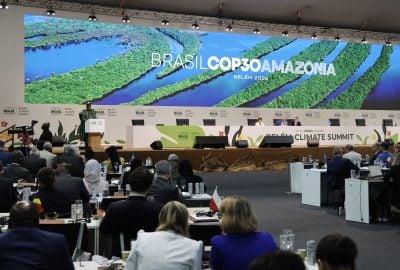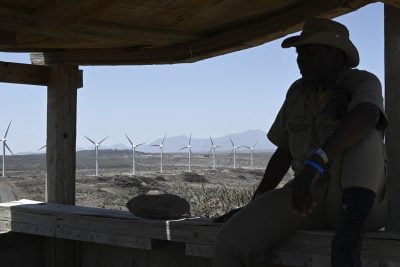Egypt’s presidency of Cop27 presents opportunities for African negotiators but may stunt progress towards emissions reduction targets, according to an expert from Chatham House.
Commencing on 7 November in Sharm El-Sheikh, this year’s conference will bring together representatives from almost 200 governments in an effort to build upon commitments agreed at Cop26 in Glasgow last November.
Hosting the conference in Africa for the first time since 2016 will draw increased attention to the continent’s plight in the face of climate change, but Egypt’s limited record on emissions reduction may jeopardise chances of a productive settlement, writes Karim Elgendy, associate fellow for Chatham House’s Environment and Society Programme.
“The Egyptian nationally determined contribution (NDC) – its 2030 pledge under the Paris Agreement – does not include any quantifiable emission reduction targets,” Elgendy says.
The country’s leadership has dug in its heels amid criticism of its expansion of natural gas production.
When interviewed as a member of Egypt’s delegation in Glasgow, Ayman Amin, deputy director of environment and sustainable development in Egypt’s foreign ministry, said “We aren’t ready to present absolute numbers or to set a date for peak emissions… If you want to ask me to deliver on mitigation, you have to raise your ambition on finance.”
‘Egypt risks derailing global decarbonisation’
Echoing the concerns of many climate watchers, Elgendy urges Egyptian negotiators to consider that “not pushing for more emission reductions at this critical moment risks derailing global decarbonisation momentum and undermining global climate action”.
“Egypt is one of only a few countries which failed to submit an updated NDC in 2021 and its upcoming update will not include an economy-wide carbon reduction target, writes Elgendy.
“Egypt has also never published a long-term strategy and has no decarbonisation plans despite independent estimates it should cut rising emissions by one-quarter by 2030, and by two-thirds by 2050 to be aligned with the Paris Agreement. This partly explains why observers rate Egypt’s climate action as highly insufficient.”
What role for natural gas in African development?
Despite this, it will be difficult to convince African leaders that Egypt’s emissions-intensive energy sector – which acts as a gas hub for the Eastern Mediterranean – does not present an attractive model for economic development.
It has not gone unnoticed that natural gas has led a remarkable economic recovery in a country which was plagued by regular blackouts as recently as 2014.
Now the second-largest gas producer in Africa, Egypt comfortably generates more than double its peak national demand for energy, setting an example for developing nations with large unexplored gas reserves such as Ghana, Mozambique, Senegal and Mauritania.
Even though the African continent stands to suffer severely from emissions-led increases in global temperatures, bringing reliable power to the 590m people who still lack access to electricity in 2022 is a priority which may distract from the serious consideration of climate objectives.
Africa must rally around a consistent negotiating platform
November’s conference will be held in Africa for the first time since Morocco hosted Cop22 in 2016 and leaders have recognised that the continent must speak with one voice if it is to take full advantage of a rare African presidency.
Addressing African heads of state and government on the sidelines of the recently-concluded UN Ocean Conference in Lisbon, Kenyan President Uhuru Kenyatta emphasised that “Africa and its member states… must synchronise its messages and speak with one voice in all inter-related global events. We must use our collective bargaining weight to its full advantage to influence the outcome of these multilateral processes.”
With the agenda for Cop27 yet to be decided, Egypt’s leadership raises challenging questions about what form a coordinated African negotiating position might take.
Political tensions over water supply from the Blue Nile have had a chilling effect on the Arab Republic’s relationship with its upstream neighbours in recent years: if the obstinacy and suspicion which have characterised settlement negotiations with Ethiopia over the operation of the Grand Ethiopian Renaissance Dam are a sign of things to come, Egypt may struggle to provide effective leadership in November.
Egypt’s success in attracting climate finance may provide a way forward
Egypt’s ability to attract climate finance in recent years will strengthen its Cop presidency. The economic stability provided by gas production has helped to establish it as a primary destination for green investment.
Twenty-seven percent of multilateral climate finance in the MENA region is targeted towards Egypt and a sovereign green bond worth $500m was more than seven times oversubscribed when it was issued in 2020.
This, Elgendy notes, demonstrates that “Egypt is open to dialogue – not just on refining the Cop27 agenda but also on reviewing its own climate priorities and leveraging its energy sector for a more ambitious transition.”
“The emerging partnership between the European Union (EU) and Egypt on renewable energy, green hydrogen, energy efficiency and – for a limited period – fossil gas demonstrates that, with constructive engagement and the right incentives, compromises can be achieved which address the demands of developing countries without jeopardising the goals of the Paris Agreement.”
Egypt’s success in attracting foreign green investments, then, could be a leading light as African negotiators convene in Sharm el-Sheikh.
Financial assistance to developing countries
The African Development Bank has costed the continent’s financing needs for the transition to green energy at $1.3 trillion over the 2020-30 period, but this meeting this target looks increasingly difficult as developed nations repeatedly fail to meet the $100bn-per-year of funding pledged to climate-threatened countries in 2010.
Egypt has made it clear that such funding must be top of the agenda at Cop27 and that it will focus on turning pledges into action.
Want to continue reading? Subscribe today.
You've read all your free articles for this month! Subscribe now to enjoy full access to our content.
Digital Monthly
£8.00 / month
Receive full unlimited access to our articles, opinions, podcasts and more.
Digital Yearly
£70.00 / year
Our best value offer - save £26 and gain access to all of our digital content for an entire year!
 Sign in with Google
Sign in with Google 



